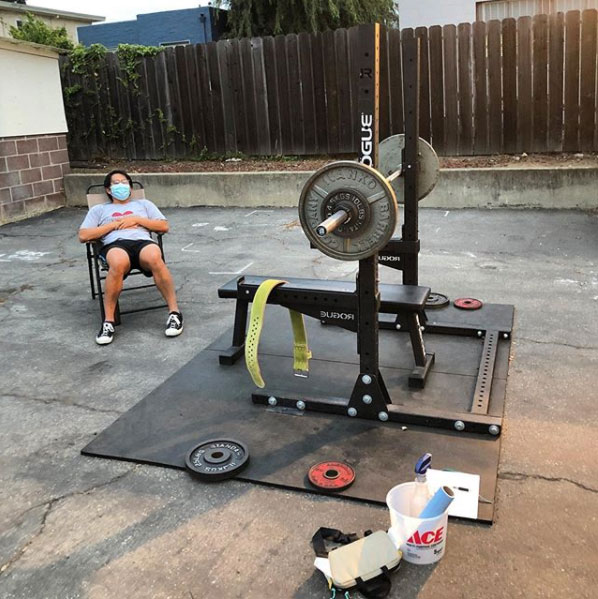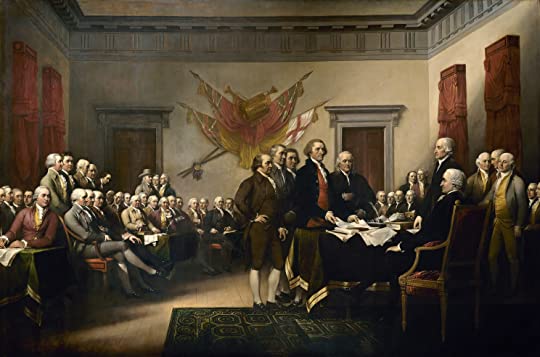I missed this last weekend as the godfather of my soon-to-be son came up to stay with us for a week so I’ve been playing the role of host. I’m almost certainly going to miss this coming weekend too, so the best I can do is throw up a post in the middle of the week to try and tide anyone following this over. Everything I do content wise has been slowing to a crawl with the third trimester of this pregnancy and it probably won’t let up. There are other things precluding me from creating however, things that have wrapped up and things that soon will be done too. Things change, but not as much as one might think.
With Kassad (pseudonym) here a lot practical things that we put off are finally getting done. We’ve figured out how to create an outdoor gym and it’s been fantastic. Getting to an actual gym has been a a hassle and it became something I simply didn’t want to do because of the demographics, rules, and sterile environment, and despite having the equipment I needed I had no space in my home to do it. We’ve slapped together a solution that seems to work however. It’s amazing being outside, feeling the grass beneath your feet, and lifting the heavy weights in the sun and wind. It feels right and natural. Gyms are already a simulation of natural exercises, but the environment makes it feel so antiseptic. The option I have pursued will not be open to most people but if you have the means in the way I do highly encourage it.
In addition to the gym, and another reason this post didn’t get out sooner, is that I have been working on a new book. It’s a novel this time, the same one that I’ve started and restarted, with actual progress being made now. I had put it on hold to work on Cultured Grugs, partly to prove to myself I could complete the process of writing a book. Cultured Grugs I will always have fondness for as my first published work, but it’s online essay nature in some ways doesn’t really feel like my first book to me. I hope that will belong to The Credit Bureau. We desperately need good fiction, and I feel ready to do it.
I was amused when someone tried to use–irrelevantly–use my status as a “self-published” author as a knock against me. Leaving aside that Antelope Hill is an independent publisher, regardless of their young age as a start-up, thinking about it it just simply becomes absurd that being self-published has any kind of negative connotation when many books have quite clearly outsold books published by established conglomerates. The negative connotation, of course, comes from the glut of vanity publications. This person wasn’t acting in good faith though, so trying to explain it is moot. It’s funny though.
Rhapsody in G Minor by Brahms
This week’s music courtesy of the wife is Brahms’ Rhapsody in G Minor. Even before I really knew I had been interested in Brahms’ biography. I told her this and one of the first gifts she ever sent me was an actual biography of Brahms. I had been drawn to his gruff but sensitive personality; not without reason my wife might say. Without going into all of that, he was also known for his love of going on long nature walks and being a friend to children, often carrying candy to give them when he came across them on his walks. Sadly writing something like that gives off a more frightening connotation now. Such are the times. There’s no more country for kindly, conservative and traditional men like Brahms. There’s no society for anyone, really.
The rhapsody in its Greek word is rooted in epic poetry. It also has the sense of being effusive in emotion, perhaps even with an epic quality. Hence why the word lends itself to pop songs like “Bohemian Rhapsody”. The musical rhapsody became very popular in the 19th and early 20th century. As a musical form they sought to break out of more rigid and traditional musical structures, highlighting a more dynamic range of emotional and tonal expressions by being more freeform. Brahms wrote his rhapsodies at the peak of his career, once his fame had started to grow in its own right, after he had escaped the shadow of his mentor and dear friend Robert Schumann. It had been three years since his first symphony. He grew his famous beard and became known for his practical jokes.
My wife sees music in colors on account of her synesthesia. I don’t. I don’t even hear much when I hear music. I might get glimpses of an image, or a notion of a feeling. I work in lyrics, but write to instrumentals. Sometimes what I hear bleeds into the text. Most times it just sets the rhythm. When I hear this rhapsody however, I hear a man filled with overwhelming emotion who is keeping it under control. He doesn’t know how to express it except in controlled bursts, like a madman in a fit of inspiration. Maybe I’m talking about myself again. I sometimes do that too much.
Regrets
The origin of a lot of these weekly posts come from morning conversations with my wife when she gets home from work. I rarely ever know what’s going on in the world, I’m not someone who checks their news feed when they first wake up, so around the breakfast table we mostly reflect on yesterday or other goings-on within our small sphere of concern. We have some neighbors who have been fighting awful lately and we wondered what it was people say about us when we aren’t listening.
My wife could tell it was bothering me and we ended up talking about some awful memories from our own pasts. For me the end and beginning of my life was college. My negative view of college was shaped by it, from the politicized brainwashing classes to the awful students and the stifling atmosphere. The predatory culture did much to shape how I viewed the world as a very ugly place for a very long time. It took too many lost years to rebuild a cohesive and healthy worldview from it. I received a lot of snide commentary from my infamous humiliation essay, but since I’ve been constantly vindicated I have no issue admitting that I poured a lot of what I saw for four years at a university and what I experienced into it. The essay was an exorcism if anything, finally closing that chapter of my life for me.
If my writing could be accused of anything I’d agree when people call it sentimental or emotional, maybe a bit wrought in trying to write to the heart. The line of people who influenced my writing from early Dostoevsky to Haruki Murakami and now to D.H. Lawrence is clear, to me at least.
Dissident activity
I love sperging out about organizational theory, especially as it pertains to online communities, so I’m going to talk a bit about Eternal September and the 1% Rule. In my opinion, these two phenomena should be the foundational principles to anyone interested in organizing an online community, whether that has a political or hobbyist bent.
The Eternal September refers to when the internet was the realm of tech geek hobbyists and people at universities, when everyone was on Usenet. Every September at schools new people would need to be acclimated and assimilated into the Usenet culture. That changed when AOL got everyone on internet with access to Usenet. The flood of new users changed Usenet and there was nothing that could be done about it. It also signified a change in the culture of the internet. It became known as the September that never ended. I would argue that Facebook and the iPhone did the same thing to the culture that sprung out of the original Eternal September, giving access to even more people it would be impossible to assimilate into that culture.
The second to know is the 1% rule. Basically, 1% of the users create the content and 99% lurk or consume it. The variation, which I agree with more is “90% of the participants of a community only consume content, 9% of the participants change or update content, and 1% of the participants add content”. Broadly this appears to just be explaining participation inequality, but the 9% of that is key to understanding the problem that occurs. We’ve seen this play out a lot in hobby circles. If the 1% is the original content and associated creators, then the 9% are often the ones that come in and end up destroying the product and its community. That’s how few it takes to do it through the participation inequality problem. You arguably don’t even need 9% of the users to destroy it, the number can actually be smaller than that due to institutional support or clout.
These are important phenomena to understand because in real life communities are typically built on physical presence, shared space, and ties that are established through blood and/or religion. Online however, especially when it’s tied to any kind of “movement”, communities are actually fragile entities that are extremely easy to upend through. It requires a dedicated and forceful 1%, a vanguard as it were, to maintain not just the rules but the culture of a place. A model that allows anyone in will either overwhelm the vanguard and change the place to its new common denominator, or a clique will attempt to enter the 9% and force a coup from within.



